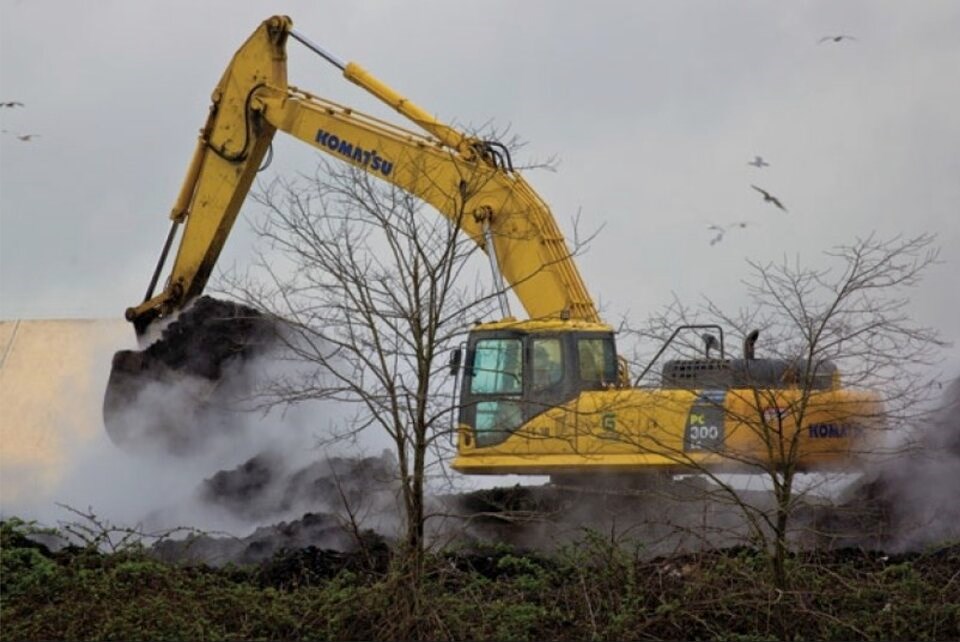A B.C. company that receives organic garbage from across Metro Vancouver, South Okanagan and Fraser Valley has been penalized $9,000 for accepting more than triple the amount of compost the facility was designed for.
In a ruling, handed down May 16 but released this week, director of the Environmental Management Act Stephanie Little found Fraser Valley Agri Waste Solutions Ltd. (FVAW) had received 25,637 tonnes of compost materials between April 2023 and May 2024. That’s more than three times the 8,000 tonnes the facility is designed for.
“Fraser Valley Agri Waste Solutions Ltd. has not provided sufficient evidence to support its claim that it remained within its permitted design capacity,” wrote Little in her ruling.
The company is located within provincial Agricultural Land Reserve about three kilometres outside of Abbotsford. It accepts organics, food scraps, paper products, yard waste and waxed cardboard.
In submissions, FVAW claimed the scale used at the entrance of their facility is also used by another composting company, Fraser Valley Renewables Ltd., to weigh incoming material.
“The total weight recorded in the inspections is therefore not an accurate reflection of the waste received by FVAW Solutions,” the company claimed.
Little was not convinced, ruling the company “has not provided any substantive evidence or operational records to support this claim.”
The director added that FVAW “offers no operational details, no weight records, and no breakdown of diverted versus composted volumes.”
Little said that omission was particularly significant given the scale of what the company's own records said it had received.
“To remain compliant, more than 17,600 tonnes would have needed to be diverted, a scale of activity that would reasonably be expected to have been documented and disclosed during inspection,” said Little.
Effluent found leaking into adjacent property
The director cited observations from inspectors that compost leachate appeared to be seeping into an adjacent agricultural field. Testing of the effluent later showed high levels of amnion, biological oxygen and coliform consistent with compost effluent.
The facility is also about one kilometre away from McLennan Creek, a fish-bearing waterway.
Little found the company did not provide conclusive evidence that drainage ditches surrounding the site were not connected to the stream — “nor do they negate the observed seepage or the potential for downstream transport during storm events,” she added.
Little upped the penalty by $2,000 for its deliberate nature but reduced it by $60,000 from the initial recommendation because the company said it gives the finished compost away for free.
The director remained “unconvinced that all compost was given away” but said the company likely derived most of its profit through service contracts or tipping fees from municipalities. However, she added, “no documentation of such contracts or revenue was presented.”
Following the ministry inspections, a lawyer for FVAWS sent a letter to the City of Abbotsford claiming — without corroborating evidence — that it had reduced its throughput by 70 per cent and removed 4,000 tonnes of stockpiled material at its facility.
That was enough to moderately reduce the company’s penalty for efforts to correct the contravention and prevent it from happening again.
“If these actions have been implemented as described, it would reduce the risk of future exceedances of the facility’s design capacity,” wrote Little.
However, she added, “the only evidence provided is a letter from legal counsel. There is no supporting documentation such as updated scale records, finalized operational plans, or third-party verification to confirm that these changes have been implemented or are on track.”
Inspectors had initially recommended a $72,000 penalty to FVAWS for failing to comply with the province’s Organic Matter Recycling Regulation. Little’s ruling dropped that to $9,000.
The company has 30 days to appeal the decision.
B.C. compost facilities found to have low levels of regulatory compliance
The decision comes following a wave of increased government security over composting facilities in B.C.
Between May 2022 and February 2023, the Ministry of Environment and the Compliance and Environmental Enforcement Branch the industry to determine how it was complying with provincial regulations.
Of the 107 registered composting facilities in B.C., 27 were inspected, resulting in 14 advisories, six warnings and five notices. Two sites were recommended for closure.
The audit concluded that rate of compliance was low at 20 per cent, though many of the infractions were mainly administrative or wouldn’t likely harm the environment or human health.
Some small facilities were found to be struggling to contain compost onsite. Among its recommendations, the audit suggested the province work to increase awareness of the potential environmental risk from unauthorized discharges of compost effluent.
“Composting facilities' odour remains a major public concern,” the audit concluded.



